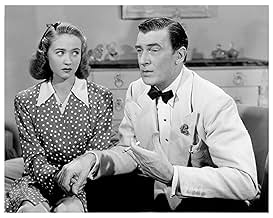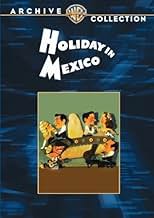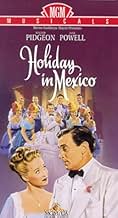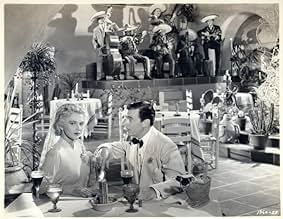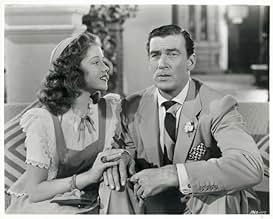Ajouter une intrigue dans votre langueThe U.S. Ambassador's (Walter Pidgeon) daughter falls for a Mexican pianist (Jose Iturbi) old enough to be her grandfather.The U.S. Ambassador's (Walter Pidgeon) daughter falls for a Mexican pianist (Jose Iturbi) old enough to be her grandfather.The U.S. Ambassador's (Walter Pidgeon) daughter falls for a Mexican pianist (Jose Iturbi) old enough to be her grandfather.
José Iturbi
- José Iturbi
- (as Jose Iturbi)
William 'Bill' Phillips
- Sam, Evans' Chauffeur
- (as Wm. "Bill" Phillips)
Ed Agresti
- Guest
- (uncredited)
Leon Belasco
- Orchestra Leader
- (uncredited)
Brooks Benedict
- Dance Extra
- (uncredited)
Histoire
Le saviez-vous
- AnecdotesContrary to rumor, a young Fidel Castro does not appear as an extra. The rumor grew from two sources: his yearbook, in which teachers noted that he was "somewhat of an actor," and a 1943 interview where Xavier Cugat cryptically referred to one of his dancers becoming "a South American general." In his 1948, Cugat references being an acquaintance of Huber Benitez, who later became a General and supporter of Fulgencio Batista, whom Castro overthrew in 1959.
- GaffesAfter her party, Christine and her father are talking in her room. There is a close-up of the drawing of her father. In later shots, it is a different picture. The face in the picture is at a different angle.
- Citations
Jeffrey Evans: Is Stanley pretty upset over your going?
Christine Evans: Yes.
Jeffrey Evans: Well, you've hurt him a lot lately - once more won't kill him.
Christine Evans: But I never meant to hurt his feelings.
Jeffrey Evans: You know, uh, if you hurt someone, it doesn't matter very much whether you meant to or not.
- Autres versions"Why So Gloomy?", a musical number featuring Jane Powell and a Chinese boy, was cut from the film. It is included in the "Musical Jukebox" feature of the 2004 That's Entertainment! DVD box set.
- ConnexionsEdited into Moments in Music (1950)
- Bandes originalesI Think of You
(uncredited)
Music based on "Piano Concerto No.2" by Sergei Rachmaninoff
Music Adaptation and Lyrics by Jack Elliott & Don Marcotte
Commentaire en vedette
This movie is burdened mostly by poor pacing. The first half of the film is a long string of diverse musical numbers connected by a few lines of dialog. Then the director seemed to realize that some kind of plot development was necessary, so the musical numbers are few and far between in the second half of the movie, which is dedicated to getting the flimsy plot moving. Then there's the grand finale with Jane Powell delivering a beautiful rendition of "Ave Maria."
Not once did I feel like I was in Mexico City. Believe it or not, you will see more keffiyehs than sombreros in this movie! Maybe the director thought it was Holiday in Morocco. However, some of the costumes are beautiful - especially some of Jane Powell's dresses.
Walter Pidgeon, who I usually like, is only fair in his role as the US Ambassador to Mexico and an all-wise, empathetic and loving, but somewhat condescending father. Jane Powell has a beautiful voice, but her acting is erratic and bordering on manic in some of the early scenes. Jose Iturbi never was an actor, but had a film career based solely on his being an excellent pianist. Ilona Massey is, likewise, not a great actress, but she is beautiful and hot. Roddy MacDowell has such a high-pitched, soft voice, it is hard for me to ever find him very convincing as a serious love-interest, even as a teenager. At the end of the day, every minute of this film seems like it is populated not by real people, but by actors playing roles.
If you like a fairly wide range of music, then the first part of this movie will delight you. I personally wanted to come up for more air between musical numbers. The two best scenes are in the second half. The funniest scene is between Pidgeon and the parents of one of his daughter's girlfriends. It is the cleverest plot device in a plot riddled with every cinematic cliché of the era, and it is quite ironic, with Pidgeon discovering he is the object of the affections of the young daughter of one of his ambassadorial colleagues.
The penultimate scene in which Pidgeon talks frankly with Powell, his daughter, about facing up to life after you've made a fool of yourself is worth wading through the trite plot, clichés and front-loaded music. And her response, as depicted in the climactic scene is suitably uplifting.
Spreading the musical numbers more evenly throughout the film, and developing the plot in a more even manner, too, would have improved this film quite a bit. As it is, it is more like sitting through two performances - first, a short concert, followed by a short film.
Not once did I feel like I was in Mexico City. Believe it or not, you will see more keffiyehs than sombreros in this movie! Maybe the director thought it was Holiday in Morocco. However, some of the costumes are beautiful - especially some of Jane Powell's dresses.
Walter Pidgeon, who I usually like, is only fair in his role as the US Ambassador to Mexico and an all-wise, empathetic and loving, but somewhat condescending father. Jane Powell has a beautiful voice, but her acting is erratic and bordering on manic in some of the early scenes. Jose Iturbi never was an actor, but had a film career based solely on his being an excellent pianist. Ilona Massey is, likewise, not a great actress, but she is beautiful and hot. Roddy MacDowell has such a high-pitched, soft voice, it is hard for me to ever find him very convincing as a serious love-interest, even as a teenager. At the end of the day, every minute of this film seems like it is populated not by real people, but by actors playing roles.
If you like a fairly wide range of music, then the first part of this movie will delight you. I personally wanted to come up for more air between musical numbers. The two best scenes are in the second half. The funniest scene is between Pidgeon and the parents of one of his daughter's girlfriends. It is the cleverest plot device in a plot riddled with every cinematic cliché of the era, and it is quite ironic, with Pidgeon discovering he is the object of the affections of the young daughter of one of his ambassadorial colleagues.
The penultimate scene in which Pidgeon talks frankly with Powell, his daughter, about facing up to life after you've made a fool of yourself is worth wading through the trite plot, clichés and front-loaded music. And her response, as depicted in the climactic scene is suitably uplifting.
Spreading the musical numbers more evenly throughout the film, and developing the plot in a more even manner, too, would have improved this film quite a bit. As it is, it is more like sitting through two performances - first, a short concert, followed by a short film.
- krdement
- 13 juin 2010
- Lien permanent
Meilleurs choix
Connectez-vous pour évaluer et surveiller les recommandations personnalisées
Détails
Box-office
- Budget
- 2 345 000 $ US (estimation)
- Durée2 heures 8 minutes
- Rapport de forme
- 1.37 : 1
Contribuer à cette page
Suggérer une modification ou ajouter du contenu manquant


